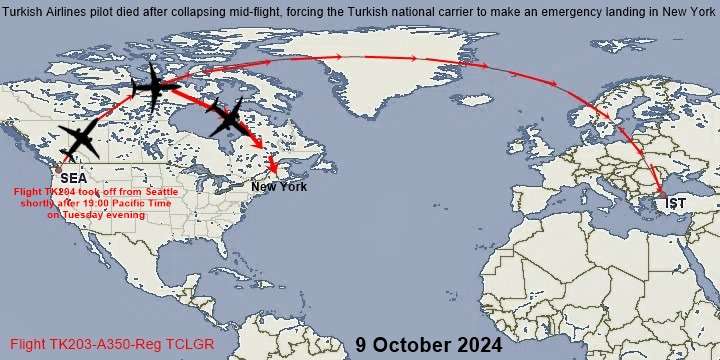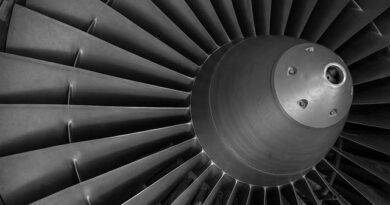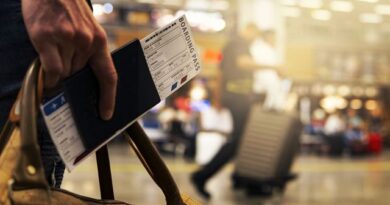Turkish Airlines Captain Dies Mid-Flight, Emergency Landing Saves Passengers
On October 9, 2024, Turkish Airlines Flight TK204 from Seattle to Istanbul faced a tragic incident when Captain İlçehin Pehlivan, 59, lost consciousness mid-flight over Greenland. Despite immediate medical attention from the flight crew, he passed away before the emergency landing at New York’s JFK Airport at 2:56 AM. The Airbus A350, with over 300 passengers on board, was guided safely to the ground by the co-pilot. Turkish Airlines captain İlçehin Pehlivan dies in mid-flight. (AeroTime)(AirlineGeeks.com |).
Captain Pehlivan, who had been with Turkish Airlines for 17 years, had undergone a routine medical examination in March 2024, which revealed no health concerns. The exact cause of his sudden death has not been officially disclosed, but such incidents often involve cardiovascular problems or undetected conditions, which can develop unexpectedly, even in individuals cleared for work (AeroTime)(Channel NewsAsia).

Health Risks for Pilots: A Demanding Profession
Pilots, like Captain Pehlivan, face several occupational health risks that can emerge due to the unique stresses of their profession. The key health concerns associated with piloting include:
- Cardiovascular Issues:
- Cardiovascular problems are a significant risk for pilots, especially those over 50. Long hours sitting in the cockpit, combined with the high stress of flying, can increase the likelihood of heart attacks or strokes. Research indicates that heart disease remains a leading cause of sudden incapacitation among pilots(AeroTime)(Channel NewsAsia).
- Chronic Fatigue:
- Pilots often face irregular schedules, long flight hours, and frequent time zone changes, all of which can lead to chronic fatigue. The constant disruption of circadian rhythms weakens immune systems and increases the risk of cognitive impairments and physical health problems. Fatigue is a major factor in aviation incidents, making it a critical focus of health management(AirlineGeeks.com |).
- Mental Health Stress:
- The responsibility of ensuring passenger safety combined with the intense focus required during flights can contribute to high stress levels. Pilots often report anxiety and mental strain, especially those flying long-haul international routes(Channel NewsAsia). Extended periods away from family and loved ones further exacerbate mental health challenges.
- Deep Vein Thrombosis (DVT):
- Sitting for extended periods without movement increases the risk of DVT, a condition where blood clots form in the legs. Although more commonly associated with passengers, pilots are also at risk, given their prolonged seated position during flights.
- Hearing Loss:
- Constant exposure to engine noise, even in modern aircraft with better sound insulation, can lead to gradual hearing loss over time. Pilots are advised to undergo regular hearing assessments to mitigate this risk.
How Pilots Can Stay Healthy
Maintaining optimal health is essential for pilots to ensure both personal well-being and flight safety. Some strategies for pilots include:
- Regular Exercise: Engaging in cardiovascular and strength-building activities helps maintain heart health, reduces stress, and combats the effects of prolonged sitting. Exercise is also an effective way to regulate sleep patterns, which is essential for combating jet lag.
- Healthy Diet: Nutrition plays a critical role in managing energy levels, especially during long-haul flights. Pilots are encouraged to avoid high-fat, high-sugar meals and focus on balanced diets rich in fruits, vegetables, lean proteins, and whole grains.
- Sleep Hygiene: Given the irregular schedules, pilots should prioritize quality sleep. Strategies like using blackout curtains, limiting caffeine intake, and establishing consistent pre-sleep routines are vital in reducing fatigue.
- Mental Health Support: Airlines are increasingly offering mental health resources, such as counseling and stress management programs, recognizing that emotional well-being is as important as physical health for pilots. Mindfulness and meditation can also help reduce anxiety and promote relaxation.
Conclusion
The tragic loss of Captain İlçehin Pehlivan underscores the health risks pilots face daily. Despite rigorous medical checks, the unpredictable nature of some conditions—especially cardiovascular issues—remains a threat. Pilots need to take proactive steps in managing their health, focusing on rest, fitness, and mental wellness. This incident highlights the importance of health vigilance in one of the most demanding professions (AeroTime)(Channel NewsAsia)(AirlineGeeks.com |).


